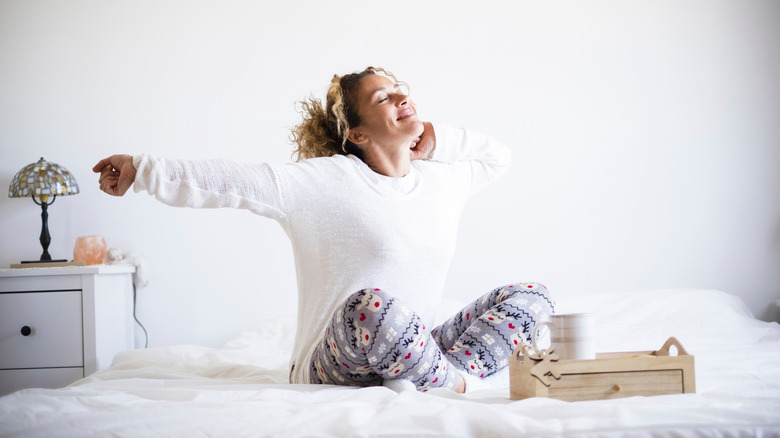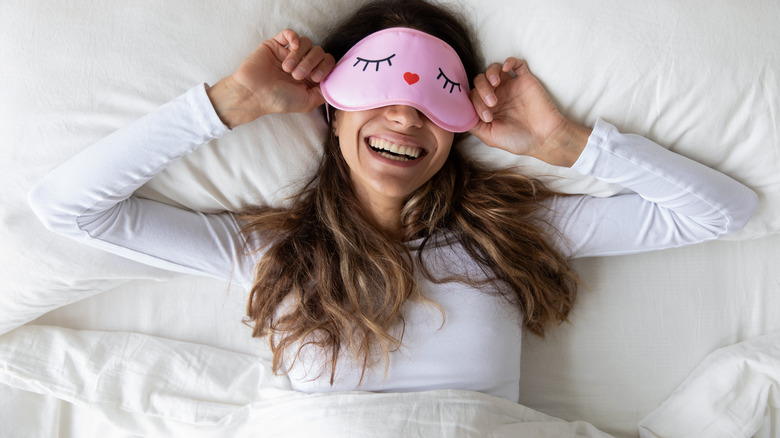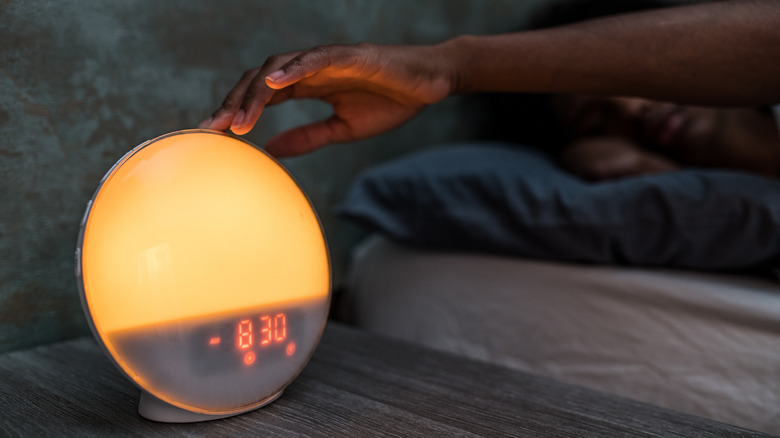How Sunrise Alarm Clocks Can Dramatically Boost Your Morning Mood This Winter
We may receive a commission on purchases made from links.
Back when Longfellow romantically penned "Awake! it is the day," he was brushing the mist off the sea and poking birds for a good sing song to announce the night is gone. Since then, we have lowered the bar of winsomely greeting our mornings quite a bit, given that most of us are jarred awake by the dirge of a cellphone alarm.
Longfellow would have a tough time waxing poetic about that — not that we love it either. Sleep, to put it mildly, has become a problem. We sleep poorly and we wake up even worse, which makes us prime candidates for all kinds of health and mental wellness problems, says the CDC. To further complicate matters is the fact that winter looms — say hello to dark mornings that stay dark even longer as the weeks go by.
This is where sunrise clocks hope to ease our weary morning ennui. Their steadily brightening simulated sunrise seems to boost hormones that add a pep in our step, a measure that will run its course all day then subsequently soothe us into a beneficial night's sleep when the time comes.
That is a lot to promise. However, it looks like science is on their side. Sunrise alarm clocks could be just the thing to balance our circadian rhythm, fight sleep disorders, battle insomnia, and maybe even defend our hearts from cardiac events. Success at combatting even one of those issues makes them worth checking out.
Why they work
Sunrise alarm clocks started making their case back in 1989. Researchers found they could reduce depression in seasonal affective disorder (SAD) subjects by simulating a 30-minute sunrise over a several day test period. They also saw that sunrise alarm clocks cut early morning grogginess, shares Sleep Review.
Studies showed further promising results for all kinds of serious conditions, like patients with dementia as well as bipolar disorder symptoms who improved sleep duration thanks to the simulated morning light. Add to that parents of surly teenagers who report that these clocks are helping their kids successfully (finally!) get out of bed in the morning.
The sunrise clocks manage an intricate dance of light and timing that affects our melatonin production that in turn affects everything — from how alert we are during our waking hours to how well and how long we sleep later that night. The early morning light also triggers in us a measured, steady release of cortisol that shrugs off sleepiness, stimulates our alerted state, and sets our circadian clock for the day. That means our biorhythms will be more predictably prepped for sleep as nighttime approaches and should promote production of melatonin to help that along (via Psychoneuroendocrinology).
As if that wasn't enough, the helpful cortisone levels and the kinder, gentler way these clocks usher in the dawn's early light helps protect our hearts from cardiac episodes in the vulnerable sleep-wake hours (per Chronobiology).
Consider color, sound, and simplicity
One of the biggest considerations when determining which sunrise alarm clock works for you is color. Finding a pleasant hue that eased them into their day is why reviewers from The New York Times, Wired and more picked the Philips SmartSleep Wake-up Light HF3520/60 as their favorite. It starts off with a red tone that transitions into brighter shades. Reviewers also thought its bells and whistles (radio, backup alarm) and its minimalist, modern look make it a most appealing option, if a bit spendy.
Instagram mom and daughter duo @vivizoneofficial went for a different sunrise alarm called the Dekala Arkenstone Smart Ambient Light. They liked it for its color choices and sleep-aid white noises like river creek or campfire crackles. Forbes senior strategy editor @lindsayboyers_ preferred the Casper Glow Light. It is a pretty yellow light that's warm (though you are stuck with it -– you can adjust brightness only). The reason this one is a fan fave with some reviewers is because it's so easy. Ready for bed? Just flip it over and a sunset will commence, with a sunrise scheduled for morning.
There are plenty more options from there, including the Hatch Restore (10 shades, 36 alarm sound options), or the Echo Dot that can work in conjunction with Alexa. A starter clock for beginners might be the Wake Up Light A200. It's a no app, touch-button sunrise alarm — a simple solution that even Longfellow might have found poetic.



